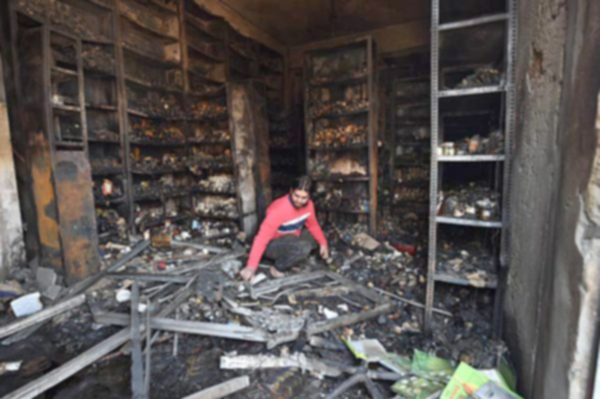The Modi government is so thin-skinned that even mild criticism is seen as an attack. Dissent is seen as sedition, and if you happen to be a dissenting Muslim, you risk being labelled a traitor
By Tavleen Singh
News of the first deaths from coronavirus in the United States came soon after I landed in New York last week. It is not a good time to be travelling but I have an exiled son to visit, so here I am. The new pandemic is almost more of an obsession in this city than the possibility that the Democratic Party may finally have a candidate to challenge Donald Trump. All conversations wherever I go revolve around these two subjects.
But, I have found time to chat with Indians of the diaspora and as usual they continue to be more absorbed by what is happening inside India. As someone who has just arrived from the motherland, I have been bombarded with questions of the following kind. Is it true that the people who died in the Delhi riots were nearly all Muslim? Is it true that police openly supported Hindu mobs?
Is it true that even judges have started speaking in partisan voices? Has India really become a Hindu Rashtra already? If this is true what will happen to the Muslims? Is India going to move backwards into times of medieval barbarism instead of forwards? What happened to Narendra Modi’s promise of ‘achche din’? I barely begin to respond to one question when another immediately comes my way, and so as I sit down to write this on a cold, clear New York morning, I ask myself the same questions and the answers depress me.
What disturbs me most is that there appears to be a dangerous collapse of the machinery built specifically to protect the rule of law. The BBC shows pictures of policemen in uniform helping a mob throw stones and, as that old cliché goes, one picture is worth a thousand words, so it is not possible to dispute that this did happen.
Then comes the story of a Supreme Court judge openly praising the Prime Minister as a ‘versatile genius’ and this comes as a brutal reminder of how feebly the honourable judges of our highest court defended the right to habeas corpus.
As I was about to descend into the depths of gloom came the condemnation of the judge’s remarks from the Supreme Court Bar Association and pictures of the wonderful farewell that lawyers gave Justice S Muralidhar, and my gloom lifted slightly. His mysterious midnight transfer on the day that he questioned the government’s handling of the Delhi riots has been justified as routine. But, denial has become the Modi government’s default response to all questioning.
The most interesting and reassuring thing that I have noticed on this visit to New York is that Indians of the diaspora continue to be hopeful about India’s future despite their misgivings about the road that Modi has chosen to take. They admit that they are ashamed to see attempts to turn 200 million Muslims into second-class citizens in their own country, and ashamed that there has been so little condemnation of this in the Indian media, but they continue to hope that the roots of Indian democracy are strong enough to resist every assault.
On a rainy New York evening in the home of an Indian who has lived here for decades I met a fellow-traveller from the motherland. He was from the world of business and admitted that he was a disappointed man. Disappointed not just by the government but by his own community. ‘I was there,’ he said ‘when Rahul Bajaj dared to tell Amit Shah that there was an atmosphere of fear in the country and that it was fear that was making it difficult for businessmen to tell him the truth about how bad things were.
When he said this there was huge applause from the gathering and then suddenly everyone began to distance themselves from what Rahul said. Do we in India deserve what is happening because of our cowardly response to everything that the government does? Probably. But, it has to also be said that the Modi government is so thin-skinned that even mild criticism is seen as an attack.
Dissent is seen as sedition, and if you happen to be a dissenting Muslim, you risk being labelled a traitor. If you are a dissenting businessman, you risk being raided by the tax department. If you are a dissenting journalist, you risk being silenced in more ways than one. There is little doubt that there is more repression in the air of our dear Bharat Mata than at any other time except during the Emergency.
Having said this, I feel the need to add that the Prime Minister is not the only person responsible for making India seem increasingly like an illiberal democracy, if not one that has already moved away from democratic rights that go beyond being allowed to vote. What has happened has happened with the cowardly complicity of Indians who have the power to speak up for those who have no voice.
We have failed too often to do this since the beginning of Modi’s second term. So, his government has taken it as given that the levers of repression can continue to be tightened. To end on a happy note, it is cheering to be in a country in which democracy is so robust that many, many ordinary people admit openly that they would like to see Donald Trump lose next time around.
This article first appeared in the print edition on March 8, 2020 under the title ‘Repression & courage’.


